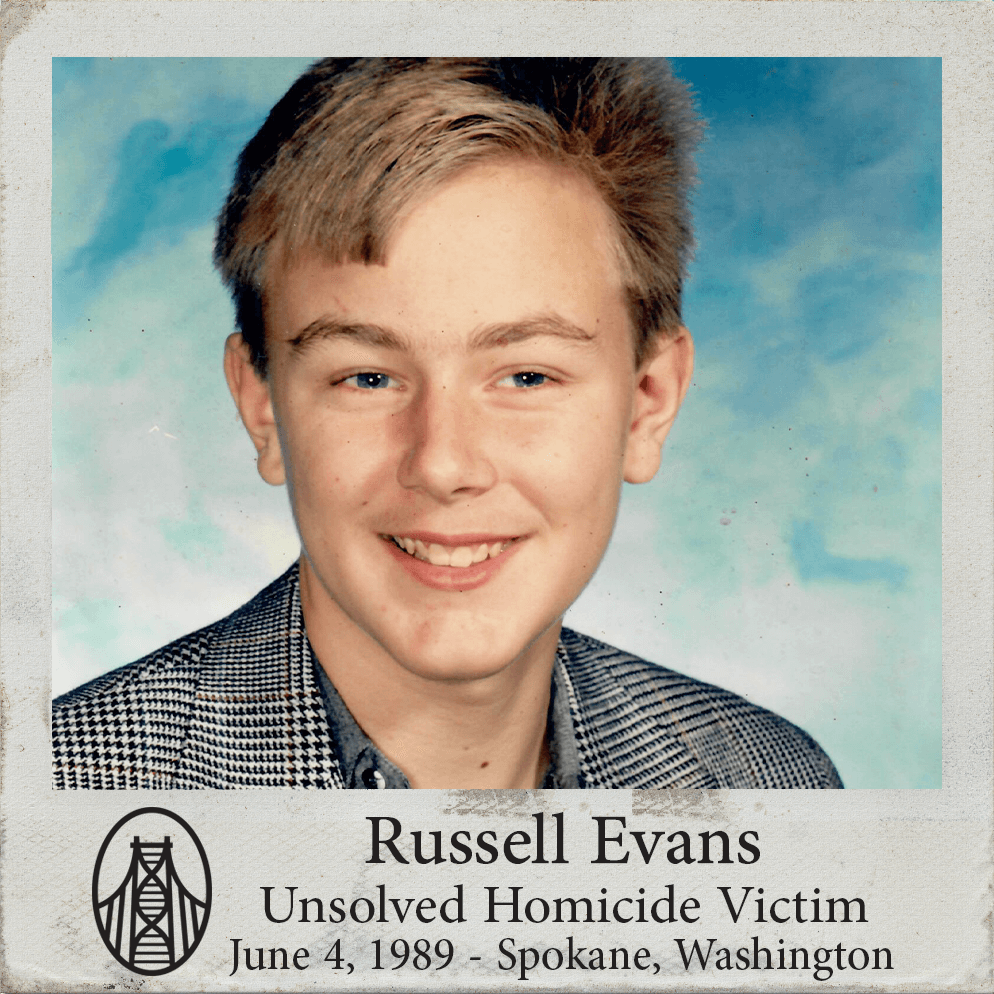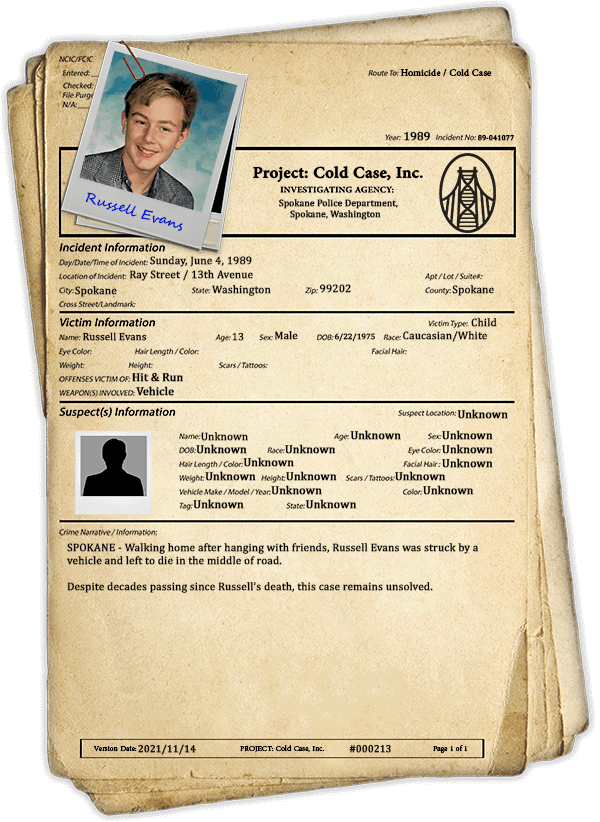
This story is part of a collaborative project between Project: Cold Case and a University of North Florida Journalism class.
Russell Evans loved basketball.
The 13-year-old from Spokane, Washington had a passion for the sport. He always dreamed of becoming a professional player.
He attended basketball camps, transferred from private to public school to play better competition, and worked so hard to one day get a college scholarship to play the game he loved.
Dianna Gulick has fond memories of her older brother. “Although he was nine years older, he was fun to be around,” she recalled. “He was protective, but he’d always play with me, give me piggyback rides, and hassle me, just like brothers do.”
Christian Rossenau, Russell’s cousin and good friend, describes him as an adventurous spirit. “He had lots of energy and loved to run around and explore. He was athletic, super busy, and wouldn’t stop moving,” he said. “There was never a dull moment when I was around Russell.”
Russell’s dreams and the time he had to spend with those he loved were brought to a halt on June 4, 1989.
That night, Russell was found beaten and run over in the street after a hit-and-run.
It has been over three decades since Russell’s murder, but the impact it had on his family can still be felt to this day.
Dianna can still recall that day, despite being so young.
“I was five years old when it happened,” she recalls.
“It came out of nowhere. Earlier that day, Russ and some of his friends got into an argument with three older teenagers over a girl. He defused the situation, but before the older boys went away, reports say that one of the kids told Russ and his friends that ‘one of you is going to die tonight.’”
“A few hours later – or so the story goes – a lady driving down the road found Russell lying nearby. At that point, he was still conscious and yelling for his friend.”
Russell would be transported to the hospital around 1:00 a.m. but succumb to his injuries just a few hours later at 9:00.
“I remember sitting on my mom’s lap as she explained that something happened and crying,” Dianna said.
To a young Dianna, it was difficult to accept that he was really gone.
“When you’re that young, the concept of ‘death’ doesn’t really register, so I thought he would be back,” she said. “It didn’t really sink in until I saw him not breathing at the viewing. I remember sitting on my mom’s lap and crying once I realized what all this meant.”
Christian was staying at a friend’s house that night. He believes that his parents were trying to protect him at that moment, as he was only told of the incident the next morning.
“The next thing I really remember was my friend’s sister looking at me and saying that I needed to go home. The look on her face is burned into my memory,” Christian recalled. “My mom got out of the car, and simply said that we lost him.”
The initial impact of Russell’s death was something that had a tremendous effect on Christian in particular.
“It was hard for a 13-year-old to see that happen, with no explanation or reason. When I got word of exactly what happened, I became very angry,” he recalled. “I hated everyone, didn’t trust anyone, and lashed out – it was a miracle I didn’t end up dead.”
“I had so many feelings of anger and frustration about why this had to happen and why nobody was doing anything about it.”
Although decades have passed since the case grew cold, the impact can still be felt throughout Russell’s family. Each family member has dealt with the fallout in their own ways.
Dianna now works as a trauma therapist in the Spokane area. She uses her experiences from then to help patients now who may be going through similar situations.
Christian, who currently lives in Idaho, says that the family’s faith also plays a great part in helping him overcome the traumatic events of that day and gives him hope for the future.
“People use their free will for good or evil, and unfortunately, evil was used on Russ,” Christian said. “But I can’t hold on to that bitterness – it’s like drinking poison and expecting the killers to die.”
“My cousin’s not missing – I’m glad we have the body- but we’re still missing who did it, and that’s hard to deal with. But I have faith that closure will come – in this life or the next.”
The family has been active on Facebook sharing Russell’s story and other Spokane-area cold cases, hoping to bring more awareness to each of them. Dianna is also petitioning the Spokane Police Department to establish a specific Cold Case Unit to tackle the numerous unsolved crimes in the area.
“The reality of life is that trauma can hit anyone at any moment, at any time, for any reason,” Dianna said, “and you can try to prevent it, but honestly there’s no way of knowing.”
“You can’t move on, it’s not something you get past, it integrates into who you are, and it’s definitely changed who I am. I had to accept that this happened and that the case may never be solved. I don’t let it eat me up inside, but I am passionate about cold cases – not just Russell’s, but every single one in Spokane.”
If you have any information on the unsolved murder of Russell Evans, please call the Spokane Police Department at (509) 456-2233.
Research & Impact
There is no universal definition of a cold case. Each agency can define what constitutes a cold case at its own will. Because of that, many families are left in the dark, believing that their loved one’s case is actively being worked by the investigators.
Oftentimes, we hear families state that they don’t want to bother the investigators and take time away from working these cases by calling to check in on the status of their loved one’s case. And, in many cases, the agency may not have a dedicated cold case unit or special detectives, the cases get glanced at when investigators have time to do so.
Our goal at Project: Cold Case is to educate survivors so that they can be the best advocate possible for their loved ones. Advocating from a more informed position opens many more doors for survivors. We always suggest that survivors start by reaching out and engaging with the investigating agency. Learn the structure of the agency – do they have a cold case department?
The goal of every interaction should be to build a working relationship to ensure that there is a consistent line of communication and an expectation to follow up after conversations.
Please consider using the buttons below to share this case in hopes that someone, somewhere will come forward and give this victim and family the answers they need and the justice they deserve.
If you have a loved one that is the victim of an unsolved homicide, please submit their case here for consideration in a future Cold Case Spotlight post.













